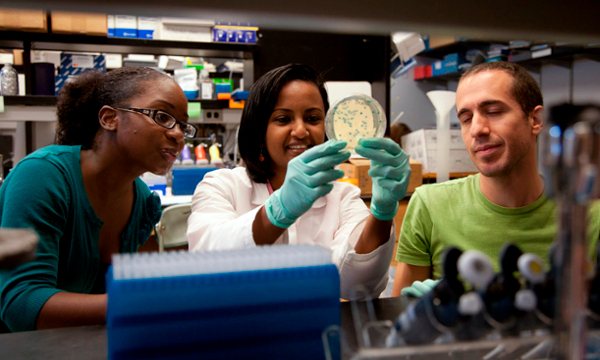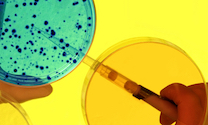Immunology Research
The Immunology and Molecular Pathogenesis (IMP) program offers exceptional interdisciplinary training in molecular and cellular immunology and the role of the immune system in the pathogenesis of infectious disease. The IMP program provides students with a unique opportunity to study all aspects of pathogenesis, ranging from basic immunology to the molecular biology of viral, bacterial, and protozoal pathogens.
The research programs of the faculty members use a wide range of experimental approaches in immunobiology, molecular and cell biology, pathobiology, and genetics. In addition, a number of IMP faculty work at the interface between basic and applied research (i.e., translational research).
In the first year, students take courses in immunology, biochemistry, and cell biology, complete three 8-week laboratory rotations and then select an advisor and laboratory for dissertation research. In the second year, students will continue their education on cutting-edge immunology by completing two literature-based immunlogy courses as well as a course to develop their scientific writing skills. In their second year, they will also dig into their lab research and work closely with their mentor to develop their project proposal and select their dissertation committee members. The third year and beyond are devoted almost entirely to completion of the dissertation research project.
Additionally, throughout their time in the IMP Program, students attend the year-long IMP Seminar Series where they are exposed to immunology research outside of Emory through invited-guest seminars as well as learning about what their peers are doing through the student Research in Progress presentations. Students typically complete this Ph.D. program in approximately six years.
Emory Resources
The highly supportive and collaborative environment within the IMP program provides many opportunities for innovative dissertation research. Today, the answers to important immunological questions can only come with the application of techniques derived from numerous disciplines. It is therefore critical that the over 280 faculty within the GDBBS give IMP students access to expertise in many areas of research, and the people in these many labs are Emory's greatest resource. In addition, the Emory community has numerous facilities that provide reagents and expertise for immunological projects. Within the School of Medicine are numerous core facilities to support research projects. These include Flow Cytometry, Transgenic Mice, Microchemical and Proteomics, and Bioinformatics core facilities. State of the art animal facilities at several locations on campus house numerous species, including a large population of non-human primates at the Emory National Primate Research Center. The IMP program also has a close relationship with the U.S. Centers for Disease Control, headquartered adjacent to the Emory campus. These fantastic resources serve to enhance the immunology research and training of the students within the IMP Program.





